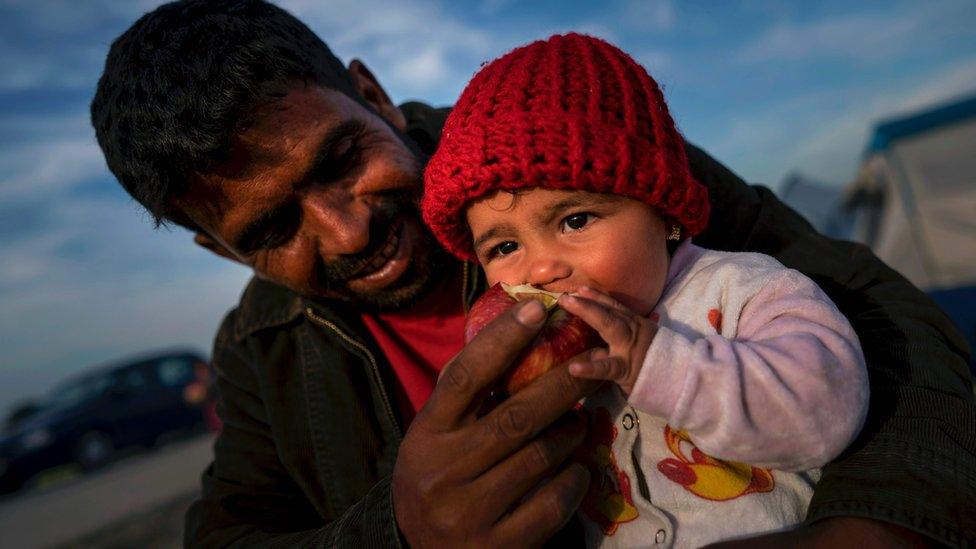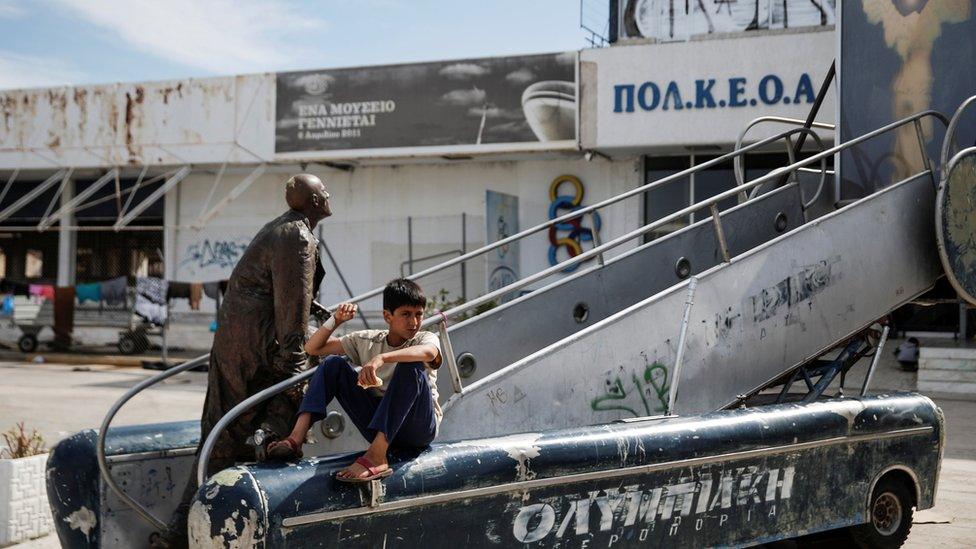Migrant crisis: EU plans penalties for refusing asylum seekers
- Published

A wave of migrants - many fleeing war and violence - have put Europe's migration systems under unprecedented pressure
The European Commission has proposed reforms to EU asylum rules that would see stiff financial penalties imposed on countries refusing to take their share of asylum seekers.
The bloc's executive body is planning a sanction of €250,000 (£200,000; $290,000) per person.
The Commission wants changes made to an asylum system which has buckled amid an influx of migrants.
The plans would require support from most member states as well as MEPs.
EU officials hope that, twinned with a deal with Turkey that has already reduced migrant numbers, tensions over migration within the bloc can be reduced.
'Fair share'
The basic Dublin regulation would be kept, requiring refugees to claim asylum in the member state in which they arrive.
However, there would be several changes, including plans to help countries receiving "disproportionate numbers" of asylum claims.
The EU already has a flagship scheme to redistribute 160,000 migrants around the continent, but it has met only a tiny fraction of this target since it was agreed in 2015.

Tens of thousands of migrants are stranded in Greece, although the number of arrivals has fallen dramatically
The planned figure of €250,000 per refused claimant could be revised but the Commission is known to want a punitive level.
The UK and Ireland can opt out of asylum policies, and the British government has already indicated it will not take part. Denmark is also exempt.
Under the fresh proposals, if a country receives more than 150% of its annual "fair share" of asylum seekers, the relocation scheme would kick in.
That share is calculated according to a country's population and economy.

"There's simply no way around it: whenever a member state is overwhelmed, there must be solidarity and a fair sharing of responsibility within the EU," Commission Vice-President Frans Timmermans said.
Countries refusing to accept their quota would effectively be fined - with the money going to frontline states such as Italy and Greece that have carried the burden.
The proposals for sanctions alarmed Central European countries that have refused to implement the refugee quota deal:
Poland's foreign minister wondered if it was "a serious proposal"
Slovakia's interior minister complained the proposed "fair share" system failed to respect reality
Hungary called it "blackmail" and "unacceptable"
The Czech Republic said it was an unpleasant surprise as it returned to a concept of mandatory quotas which had been rejected
The four countries were outvoted when the quota plan was agreed.
Poland had agreed to take some 7,000 asylum seekers and could face a fine of at least €1.75bn if the proposal goes through.
Hungary's government on Tuesday announced plans for a referendum on the EU's resettlement plans.
Flaws exposed
The Dublin regulation is designed to stop what has become known as "asylum shopping", whereby migrants make multiple asylum claims across Europe.
Since 2005, the UK has used the Dublin rule to return 12,000 asylum seekers to where they first entered the EU.
Thousands of migrants stranded in Greece face an uncertain future
But the migration crisis has exposed flaws in the policy, leaving Greece and Italy dealing with the majority of cases.
Germany effectively suspended the Dublin rule last August, when it said it would take in all Syrian asylum seekers, prompting an influx of migrants and refugees into the EU via Greece and the Western Balkans.
The numbers travelling the route fell when countries along the way set up fences or imposed border controls, but that has left some 50,000 migrants and refugees stranded in Greece.
The Commission says a European Union Agency for Asylum should be set up to oversee fairness within the overhauled rules.
There would be "stronger guarantees" for unaccompanied children seeking asylum as well as a change in the way family members are viewed when seeking refugee status.

A note on terminology: The BBC uses the term migrant to refer to all people on the move who have yet to complete the legal process of claiming asylum. This group includes people fleeing war-torn countries such as Syria, who are likely to be granted refugee status, as well as people who are seeking jobs and better lives, who governments are likely to rule are economic migrants.